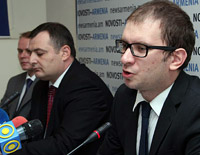The experts of the Forex Club met with journalists and spoke about the economy of Armenia. Of course the information they published (especially the part about Armenia) was no news for the journalists. The new thing was that it is possible to quote positive and optimistic opinions about the economy of Armenia even by bringing wrong statistical information. The representatives of the Forex Club said that last year the economy of Armenia slumped by 15.2% in case when this index was 14.4% instead of that.
But it is not so important because the most important thing for now is the current situation and the future. According to the experts of the Forex, the current situation is very optimistic. “The economy of our country is developing with very stabile prospective,” said the Michael Verdyan, expert of the Forex Club. His colleague from Russia, the head of the Forex Club group of companies experts’ department Andrey Dirgin has the same opinion too. According to him, the Armenian economy is very dynamic to fight the crisis but a lot of things depend on the prospective how open Armenia will be for the world. Dirgin believes if the border with Turkey is opened it will support the development of the Armenian economy because both the economic rules and logical estimations show this. The analyst believes that the cargo transportation between Armenia and Turkey will enable to ease the dependence from Georgia resulting in reduction of prices in Armenia. Dirgin believes that Armenia copes with the crisis better than Georgia and Azerbaijan. Michael Vardanyan is more optimistic than the government and he thinks that in the end of the year the economic growth rate will reach 3.7%. Let’s bring a comparison. First, Azerbaijan was not so deep stuck in crisis to say that we are on equal levels to compete. Concerning the statement that the economic development is dynamic, during the first part of the year in January-March we had 8.8% GDP growth but later the speed fell down to 2.8%. Even more, if we had positive tendencies according to months (every month compared to the same month of the previous year), the situation changed in September and the GDP fell down in September very rapidly compared to August and it was cut down by 24.6%. In fact we are not so sure in coping with the crisis. According to Mr. Verdyan, the main factors resisting the economic growth (that don’t allow the economy grow faster) are the inflation, the recession in the sector of agriculture and the high level of state debt. The slump of the agriculture sector cannot be a factor of economic development; it can only affect the growth of the GDP. Definitely the expert wanted to say this but there were some problems with the formulations. However, there will be many different opinions about the other two factors and their roles. For example, the opinion about state debt. There have always been different opinions about state debt, but no one has said so far that the growth of state debt negatively affects the GDP growth. It is hard to explain why because even the government assures that if they did not attract money from external sources to use in the domestic economy, the impact of the crisis would be worse. Of course there have been discussions about foreign debt, but these mainly were about the capacity and whether it crosses the permitted red line or no. The critics to foreign debt mainly concerned the risks that if the capacity of foreign debt grows much, the load might be so high that the government would not be able to cover. However, no economist from Armenia has said so far that the growth of foreign debt is a factor which affects the economic growth. Economists say that a very high level of inflation can ruin the economy. But still nobody speaks of inflation as a factor which impedes the development of the economy. Even more, it is accepted to say that inflation is always an integral part of economic development. Economists are more concerned of deflation because means that either the economy is falling or there are signs of recession. This tendency was evident especially during the crisis and for the prices of real estate and metals.
Inflation is interconnected with currency exchange rates. The exchange rate is the hobby of the Forex players. It is natural that they would like to pay a special attention to this issue. There have been times when they had to make a choice between the exchange rates or inflation. Especially those people were complaining of this who had their incomes in dollars because for exporters their products were becoming more expensive and becoming incompatible. They thought it would be better if the people who receive money transfers from abroad would suffer than the entire population because of inflation.
What is this policy like today? The head of the Ukrainian office of the Forex Club Nikolay Ivchenko said that the government should make a choice between encouraging the export and providing the well-being of the society by not allowing the inflation grow faster. “I think Armenia is still going through the path of increasing the export. I don’t exclude the possibility that the price of dram may grow next year, and instead of this the inflation will be weaker,” said Ivchenko. It is worth mentioning that in September the inflation rate was 9.1%, which is very high. On the other hand, the price of the national currency is growing steadily, and, for example, last year the price of dollar fell down to 360. In fact the choice between “inflation or exchange rate” has turned to the notion “both exchange rate and inflation”.

